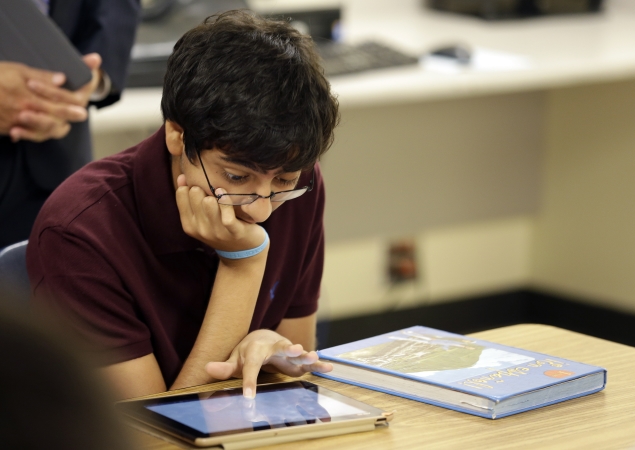Study gauges value of technology in schools
Advertisement

With school districts rushing to buy computers, tablets, digital white boards and other technology, a new report questions whether the investment is worth it.
In a review of student survey data conducted in conjunction with the federal exams known as the National Assessment of Educational Progress, the nonprofit Center for American Progress found that middle school math students more commonly used computers for basic drills and practice than to develop sophisticated skills. The report also found that no state was collecting data to evaluate whether technology investments were actually improving student achievement.
"Schools frequently acquire digital devices without discrete learning goals and ultimately use these devices in ways that fail to adequately serve students, schools, or taxpayers," wrote Ulrich Boser, a senior fellow at the Center for American Progress and the author of the report.
The analysis of the NAEP data found that 34 percent of eighth graders who took the math exams in 2011 used computers to "drill on math facts" while less than a quarter worked with spreadsheets or geometric figures on the computer. Only 17 percent used statistical programs.
The federal survey data showed striking differences among racial groups and income levels. More than half of the black students who took the eighth-grade math exam in 2011 said they used computers to work on math, while only 30 percent of white students said they did.
Advertisement
Similarly, 41 percent of students eligible for free and reduced lunches said they used computers for math drills, compared with 29 percent of students whose families earn too much for them to qualify for the lunches.
In high school science classrooms, the use of technology evidently has not advanced much past the 1980s. According to the report, 73 percent of students who took the 12th-grade National Assessment science exam said they regularly watched a movie or video in class.
Advertisement
Such data, Boser said, suggested that technology "doesn't seem to have dramatically changed the nature of schooling."
Experts who study the effectiveness of instructional technology say there is potential for some digital programs to improve teaching. John Pane, a senior scientist at the RAND Corp., said good technology allowed students to work at their own pace and independently while teachers worked with smaller groups.
Advertisement
Pane conducted a study, financed by the federal Department of Education, of an algebra software program created by Carnegie Learning, a math curriculum developer. He found that high school students who used the program, which was designed to accompany a teacher-led curriculum, showed gains on their state-standardized math tests that were nearly double the gains of a typical year's worth of growth using a more traditional high school math curriculum.
Whether those gains came from the use of technology or changes in the curriculum, he said, was hard to say. But Steve Ritter, chief scientist at Carnegie Learning, said one of the benefits of the technology was that it used the principles of cognitive science to help students gain a deeper understanding of concepts rather than simply drill math problems.
"We're not just seeing whether they got the answer right or wrong," Ritter said, "but why they got it right or wrong."
© 2013, The New York Times News Service
For the latest tech news and reviews, follow Gadgets 360 on X, Facebook, WhatsApp, Threads and Google News. For the latest videos on gadgets and tech, subscribe to our YouTube channel. If you want to know everything about top influencers, follow our in-house Who'sThat360 on Instagram and YouTube.
Advertisement
